For the sixth year in a row, the Foreign Policy Council “Ukrainian Prism” and the Regional Representation of the Friedrich Ebert Foundation in Ukraine are pleased to present findings of the experts’ team who have analysed and scored the success of Ukraine’s foreign policy in different geographic and thematic directions.
Download the research:
Although each analysed year is peculiar in its own way, 2020 can be described as truly unique in terms of limited opportunities and specific conditions in which Ukraine has been working towards its foreign policy goals. On a global scale, the COVID-19 pandemic and corresponding quarantine restrictions introduced all over the world have significantly affected the forms of cooperation between Ukraine and its foreign partners in various fields. In addition to causing a slump in trade and economy, it has influenced the choice of new priorities for international cooperation and channels to develop political dialogue. In 2020, the Ministry of Foreign Affairs of Ukraine turned into a crisis management centre, providing emergency assistance to Ukrainian citizens, who got stranded by the lockdown, and seeking opportunities to raise humanitarian aid to mitigate pandemic consequences. In most areas under review, the fight against COVID-19 has become an additional element of bilateral and multilateral dialogue of our state.
In terms of domestic policy, 2020 also had its distinctive features, which affected how foreign policy goals were set and achieved. On the one hand, this was the first full year when President of Ukraine V. Zelenskyy was in charge of the foreign policy while his team was responsible for its implementation. On the other hand, O. Honcharuk’s government was replaced by that of D. Shmyhal at the beginning of the year, which also impacted the pace of setting and implementing foreign policy tasks.
Nevertheless, the overall assessment of the foreign policy implementation in 2020 turned out to be slightly higher than in the previous year, although, in some areas, there was a significant decline in political interest and results.
The feature of this year’s edition is a new section highlighting Ukraine’s international efforts to mitigate the consequences of the COVID-19 pandemic. It is to be hoped that once the pandemic is over, Ukraine will be able to improve its overall progress in achieving strategic priorities in the international arena, and we will no longer need to assess this specific area of diplomatic efforts.
Hennadiy Maksak,
Executive Director of the Foreign Policy Council “Ukrainian Prism”
FOREIGN POLICY OF UKRAINE IN 2020
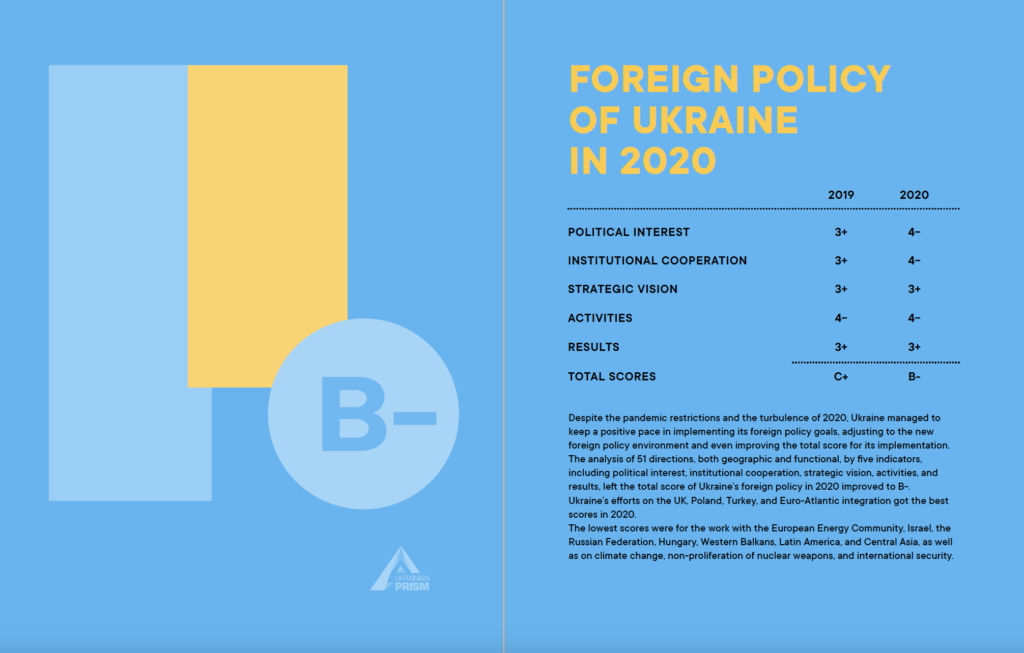
Despite the pandemic restrictions and the turbulence of 2020, Ukraine managed to keep a positive pace in implementing its foreign policy goals, adjusting to the new foreign policy environment and even improving the total score for its implementation. The analysis of 51 directions, both geographic and functional, by five indicators, including political interest, institutional cooperation, strategic vision, activities, and results, left the total score of Ukraine’s foreign policy in 2020 improved to B-.
Ukraine’s efforts on the UK, Poland, Turkey, and Euro-Atlantic integration got the best scores in 2020.
The lowest scores were for the work with the European Energy Community, Israel, the Russian Federation, Hungary, Western Balkans, Latin America, and Central Asia, as well as on climate change, non-proliferation of nuclear weapons, and international security.
Political Interest / Engagement
Foreign policy was not the top priority for most Ukrainian politicians in 2020. The President, Minister of Foreign Affairs, and Vice Prime Minister for European and Euro-Atlantic Integration were customarily those referring to this sphere the most. Compared to 2019, MPs had far less interest in the international agenda and the tools of parliamentary diplomacy in 2020. Countering Russia’s aggression, including within PACE, was the only exception.
The President highlighted the European Union, USA, UK, Canada, Turkey, consolidation of international support in the fight against Russia’s aggression, and relations with NATO in his key speeches, including the Annual Address to the Verkhovna Rada in October and the meeting with ambassadors in December.
In addition to the themes mentioned above, MFA top officials referred to relations with Moldova and Turkey, Ukraine’s engagement in the Black Sea Economic Cooperation Organization and the Danube Commission, and the drafting of Asia and Africa strategies. The Lublin Triangle and the Crimean Platform, two new formats initiated in the international arena, were in the spotlight at all levels in 2020. Information security, the fight against COVID-19, and the expansion of markets for Ukrainian exports, including in Asia and Africa, were among the top issues on the agenda, too. Economic diplomacy and the promotion of Ukrainian goods in foreign markets became key in the context of bilateral relations with almost all countries. Similarly, central in bilateral formats and international organizations was the theme of consolidating international support in the fight against Russia’s aggression.
Other ministers did not show any significant interest in foreign affairs. The exceptions included the Minister of the Interior, who dealt with relations with Italy and France within his portfolio, and the Minister of Defence, who had a strong focus on the Euro-Atlantic, US, and British tracks in the second half of 2020, after his controversial statements shortly after taking office.
The programs of O. Honcharuk’s and D. Shmyhal’s Governments did not feature much involvement in foreign policy issues. The March program of O. Honcharuk essentially limited foreign policy goals to getting visa-free access to a number of countries. The June program of D. Shmyhal mentioned work with Ukrainians abroad, countering Russia’s aggression, promotion of exports and Ukraine’s image abroad, in addition to the traditional themes of the EU, NATO, G7, G20, and relations with neighbour-states.
Belarus, Italy, Germany, Poland, Turkey, the UK, Sub-Saharan Africa, economic diplomacy, protection of human rights, and the fight against COVID-19 got the highest scores on political interest in 2020.
The least political interest was for Moldova, economic relations with Russia, Western Balkans, and Central Asia.
The overall score for Political Interest – “4-“
Institutional Cooperation
Institutional cooperation is one of the most challenging indicators as it calls for both the analysis of established formats of coordination among institutions and the discovery of uncoordinated stances or open conflicts among various Ukrainian actors. There were no notably serious conflicts on foreign policy among different institutions in 2020. Still, some actions were not coordinated enough, leading to the respective consequences. One example was coordination among Ukrainian institutions when restrictions were introduced and borders closed in response to the COVID-19 pandemic. There were some inconsistency and controversy on the US and Hungarian directions.
While Ukraine managed to hold some online meetings in bilateral commissions, a number of visits and events (see Activities) that called for institutional cooperation had to be postponed to 2021 because of COVID-19 restrictions.
Gaps remain in the appointment of Ukrainian ambassadors abroad. These positions remain vacant in Angola, Argentina, Cuba, Ethiopia, Indonesia, Ireland, Peru, Romania, South Korea, Senegal, Vietnam, the Holy See, and NATO. Ambassadors to South Africa, Turkmenistan, and Finland were appointed after a long delay.
Ukrainian institutions demonstrated the best level of coordination of foreign-policy actions in relations with the UK (preparing the visit of the President and signing a strategic agreement); Italy (on the case of Vitaliy Markiv); OSCE (Ukraine’s chairmanship at the OSCE Forum for Security Cooperation and organization of the local election observation mission to Ukraine); Council of Europe (countering Russia’s actions at PACE and several CoE projects in Ukraine); NATO (obtaining the status of an Enhanced Opportunities Partner and in security cooperation); and the EU (the launch of talks to revise the Association Agreement/DCFTA).
Government and expert community strengthened cooperation through the MFA, the Government Office for Coordination of European and Euro-Atlantic Integration, the Ministry of Culture and Information Policy etc. Throughout 2020, experts and civil society representatives engaged proactively in drafting the Foreign Policy Strategy, the Concept of Public Diplomacy, the Concept for improving public awareness on Euro-Atlantic integration of Ukraine, and the MFA’s Asia Strategy. Businesses were consulted with to determine priority markets for the exports of Ukrainian products.
Institutional cooperation got the highest scores for economic cooperation with the EU, cooperation with Lithuania, and work within the OSCE and the Council of Europe.
The lowest scores were for institutional cooperation on Latin America, Northern Europe, energy relations with Russia, and Hungary.
The overall score for Institutional Cooperation – “3+”
Strategic Vision
The new National Security Strategy can be viewed as a fresh development in strategic vision in 2020. Since the Strategy of Ukraine’s Foreign Policy Activities drafted until the end of the year but not approved officially, the National Security Strategy dated September 14, 2020, is the key document, in addition to the Constitution, that defines the hierarchy of countries by Ukraine’s national interests.
The EU and Euro-Atlantic integration, including the pursuit of Ukraine’s full membership in the EU and NATO, as well as consolidation of international support and sanctions against the Russian aggression, remain top priorities.
At the same time, the Strategy brought up some questions about the division of countries into those where cooperation is of “priority strategic nature” (the US, the UK, Canada, Germany, and France), and the countries with which Ukraine is “developing strategic partnership” (Azerbaijan, Georgia, Lithuania, Poland, and Turkey). Apart from that, the definition of priority vectors for developing partner relations — such as “with other Baltic states and countries of Northern Europe, as well as close good-neighbourly relations with the countries of Central and South-Eastern Europe” — is excessively generalized.
The analysis of other documents shows that the vision of Ukraine’s relations with the EU and NATO remains strategically determined. Strategic support for relations with G7 countries scored traditionally well. The signing of the Agreement on Political Cooperation, Free Trade, and Strategic Partnership between Ukraine and the United Kingdom of Great Britain and Northern Ireland in October was an important development.
At the same time, analysts point to the lack of a strategic vision for Ukraine’s relations with neighbour-states and the Black Sea region despite fairly proactive policies in all these areas. Apart from that, while the President and representatives of the President’s Office repeatedly highlight countries in the Middle East and North Africa, the issue of a strategic vision for relations with them remains open.
Ukraine’s foreign policy vision in relations with Canada, Georgia, Germany, Lithuania, Turkey, the UK, the USA, and NATO, as well as for building international support to counter Russia’s aggression, got the highest score.
The lowest score was for the strategic vision on Western Balkans, Latin America, Iran, Israel, Hungary, economic relations with Russia, and non-proliferation of nuclear weapons.
The overall score for Strategic Vision – 3+
Activities
Ukraine’s foreign policy activities were greatly affected by the COVID-19 pandemic in 2020. The success of those activities, however, relied on the capacity to quickly adjust to the new restrictions, establish new channels of communication, shift dialogue at all levels to the online format, and find common points in the fight against the pandemic. As a result, Ukraine’s embassies bore the brunt of maintaining bilateral dialogue throughout the year.
From March onwards, evacuation of Ukrainian citizens, consular assistance, and obtaining medical supplies and humanitarian assistance were the key challenges for most embassies. The way these issues were solved demonstrated the MFA’s readiness to work in crisis situations, as well as geographic gaps in Ukraine’s diplomatic presence in the world. The most proactive embassies and consulates at the stage of bringing Ukrainian citizens back home were in Ankara, Berlin, Budapest, Chisinau, Istanbul, Frankfurt, Prague, São Paulo, Warsaw, Vienna, and Zagreb.
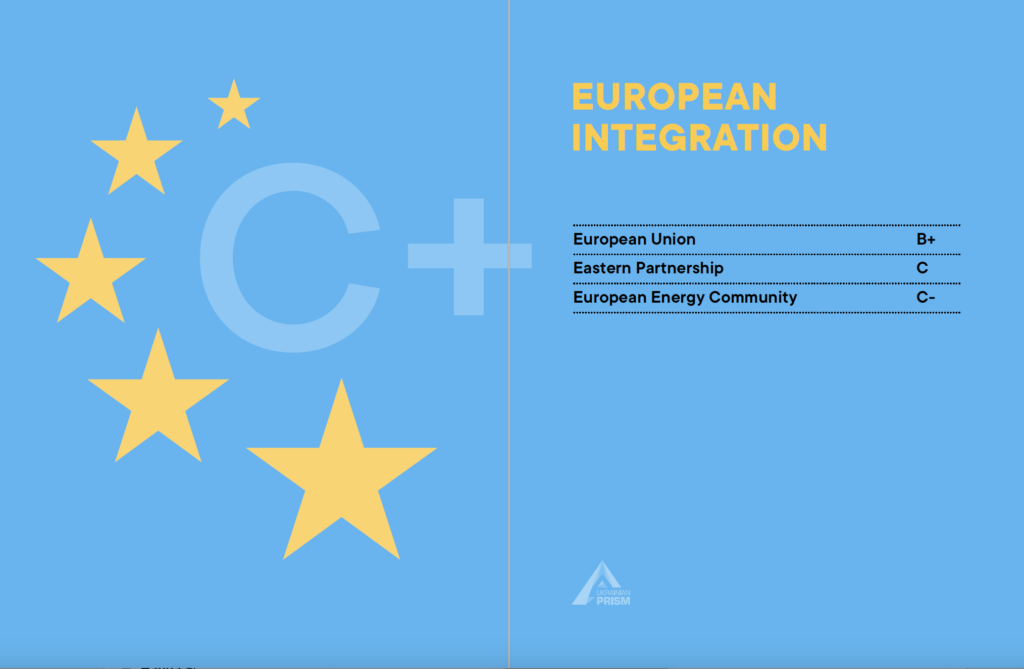 European integration was traditionally one of the most intense segments of Ukraine’s foreign policy. However, this proactive approach only applied to the political and economic dimensions, while there was far less progress in the Eastern Partnership and Energy Community. Despite the COVID-19 restrictions, Ukraine was one of the few countries that kept an intense offline dialogue at the highest and top levels, in addition to the online component, thanks to the meetings of President V. Zelenskyy, Vice Prime Minister O. Stefanishyna and Foreign Minister D. Kuleba with the EU leaders and top officials. In practice, however, the implementation of the EU norms and standards slowed down noticeably compared to the pace pledged earlier.
European integration was traditionally one of the most intense segments of Ukraine’s foreign policy. However, this proactive approach only applied to the political and economic dimensions, while there was far less progress in the Eastern Partnership and Energy Community. Despite the COVID-19 restrictions, Ukraine was one of the few countries that kept an intense offline dialogue at the highest and top levels, in addition to the online component, thanks to the meetings of President V. Zelenskyy, Vice Prime Minister O. Stefanishyna and Foreign Minister D. Kuleba with the EU leaders and top officials. In practice, however, the implementation of the EU norms and standards slowed down noticeably compared to the pace pledged earlier.
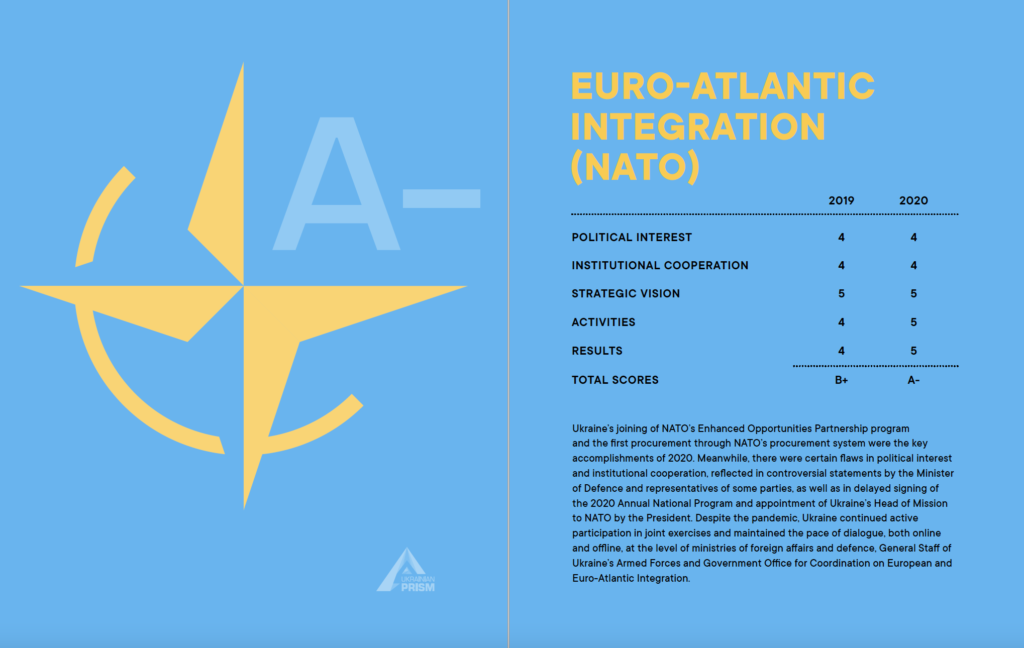 Despite the pandemic, the Ukraine-NATO dialogue was active at all levels in 2020. Numerous meetings and visits to Brussels of the President, vice prime ministers, ministers of defence and foreign affairs and Chief of the General Staff were complemented with joint exercises and engagement in NATO missions, participation in NATO reflection process and flights under SALIS, a program for strategic deliveries, whereby airplanes delivered supplies to the Czech Republic, Denmark, Germany, France, Poland, Spain, Slovakia, and the USA.
Despite the pandemic, the Ukraine-NATO dialogue was active at all levels in 2020. Numerous meetings and visits to Brussels of the President, vice prime ministers, ministers of defence and foreign affairs and Chief of the General Staff were complemented with joint exercises and engagement in NATO missions, participation in NATO reflection process and flights under SALIS, a program for strategic deliveries, whereby airplanes delivered supplies to the Czech Republic, Denmark, Germany, France, Poland, Spain, Slovakia, and the USA.
Consolidation of international support in countering Russia’s aggression was traditionally a top priority in Ukraine’s foreign policy activities and a key theme both in bilateral dialogue with partners and in work within international organizations. Ukrainian diplomats operated proactively to support Ukraine in international courts, including Ukraine vs Russia case at the European Court of Human Rights. Work continued to keep and expand sanctions and expand the cooperation formats, including via the newly-announced Crimean Platform.
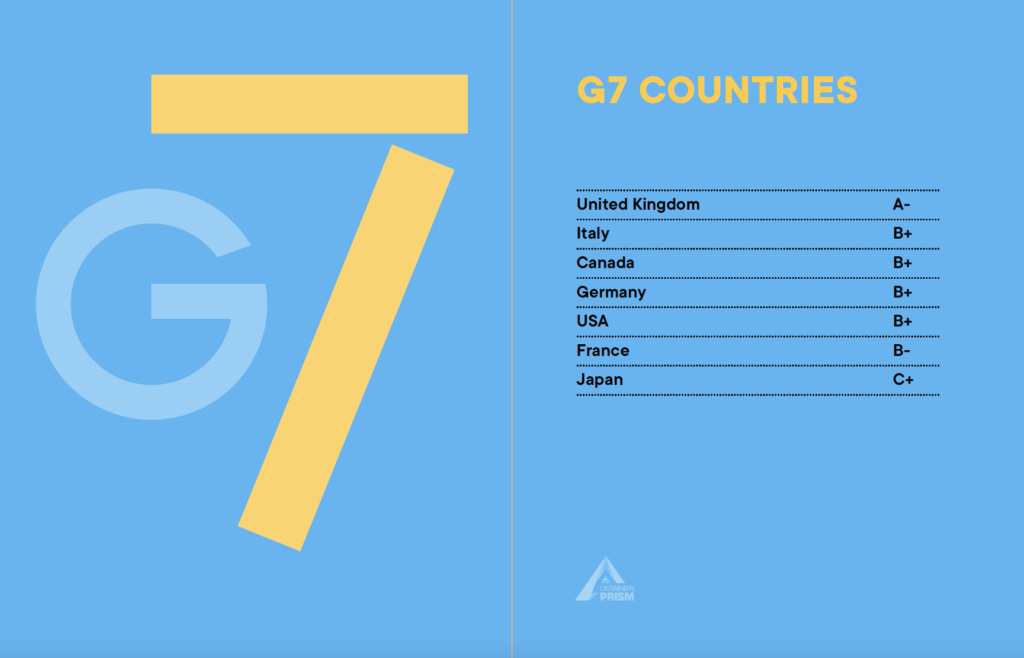 In cooperation with the G7 countries, the most proactive dialogue was with the UK, Canada, and the US. In October, President Zelenskyy visited London. Various online meetings with representatives of the UK Parliament, as well as joint exercises, took place throughout the year. Telephone conversations and online meetings/visits became the generally accepted new norm in 2020. These contacts were the most proactive with Canada and Germany. A number of high-level visits to Italy focused on the security dialogue, Ukraine’s European aspirations, and the release of Vitaliy Markiv from an Italian prison.
In cooperation with the G7 countries, the most proactive dialogue was with the UK, Canada, and the US. In October, President Zelenskyy visited London. Various online meetings with representatives of the UK Parliament, as well as joint exercises, took place throughout the year. Telephone conversations and online meetings/visits became the generally accepted new norm in 2020. These contacts were the most proactive with Canada and Germany. A number of high-level visits to Italy focused on the security dialogue, Ukraine’s European aspirations, and the release of Vitaliy Markiv from an Italian prison.
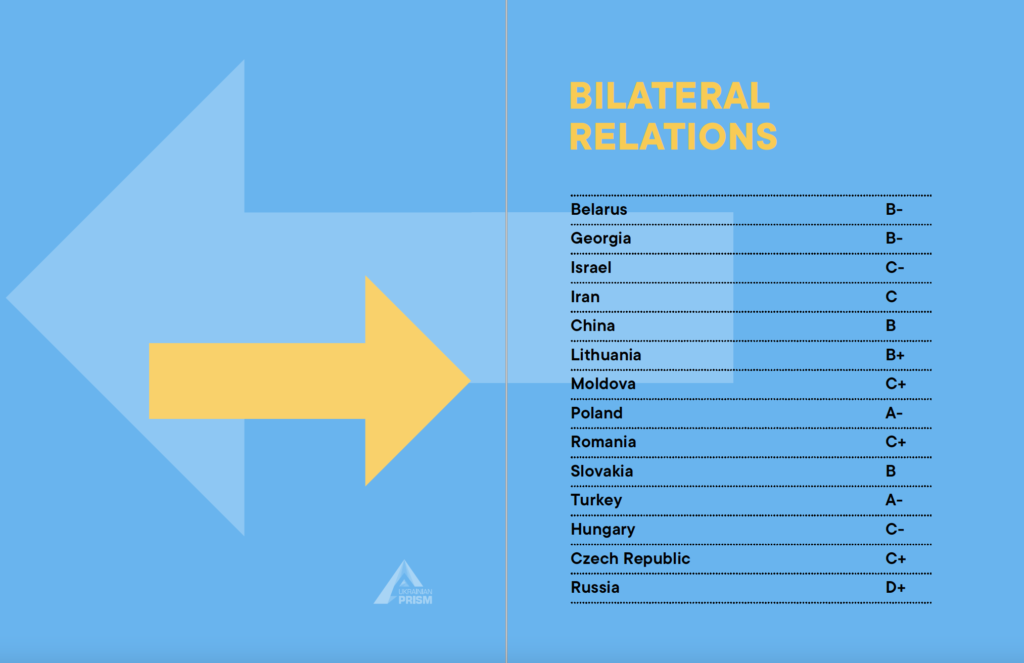 In bilateral relations, dialogue with Lithuania, Poland, and Turkey traditionally had the best dynamics. Numerous government and parliament meetings continued. President V. Zelenskyy met twice with Polish President A. Duda and Turkish President R.T. Erdogan. The first Ukrainian-Turkish meeting in the new 2+2 format (two foreign ministers + two defence ministers) took place in December.
In bilateral relations, dialogue with Lithuania, Poland, and Turkey traditionally had the best dynamics. Numerous government and parliament meetings continued. President V. Zelenskyy met twice with Polish President A. Duda and Turkish President R.T. Erdogan. The first Ukrainian-Turkish meeting in the new 2+2 format (two foreign ministers + two defence ministers) took place in December.
While direct bilateral contacts shrank in many areas, the high level of interaction between the Ukrainian and Romanian MFAs and MoDs was notable. President Zelenskyy’s visit to Slovakia in September had a positive impact as the first official visit of the Ukrainian head of state to Bratislava since 2011.
Bilateral relations with Georgia were once again of a pendulum nature, swinging from dialogue between presidents and prime ministers to the diplomatic crisis due to harsh statements by former Georgian President M. Saakashvili. Relations with Hungary followed the same dynamics, going from tensions during the year due to possible interference of Hungarian politicians in Ukrainian elections to a resumption of the intergovernmental economic commission’s work after a break of seven years.
Dialogue with Iran intensified as a result of the tragic event — the investigation of the downing of a Ukrainian plane near Teheran.
Despite President Zelenskyy’s working visit to Israel in January, some pace was lost in relations with the country compared to 2019.
The China policy was essentially guided by the economic agenda and receipt of medical supplies to fight the pandemic. Trade is growing without any intensification in the political dialogue.
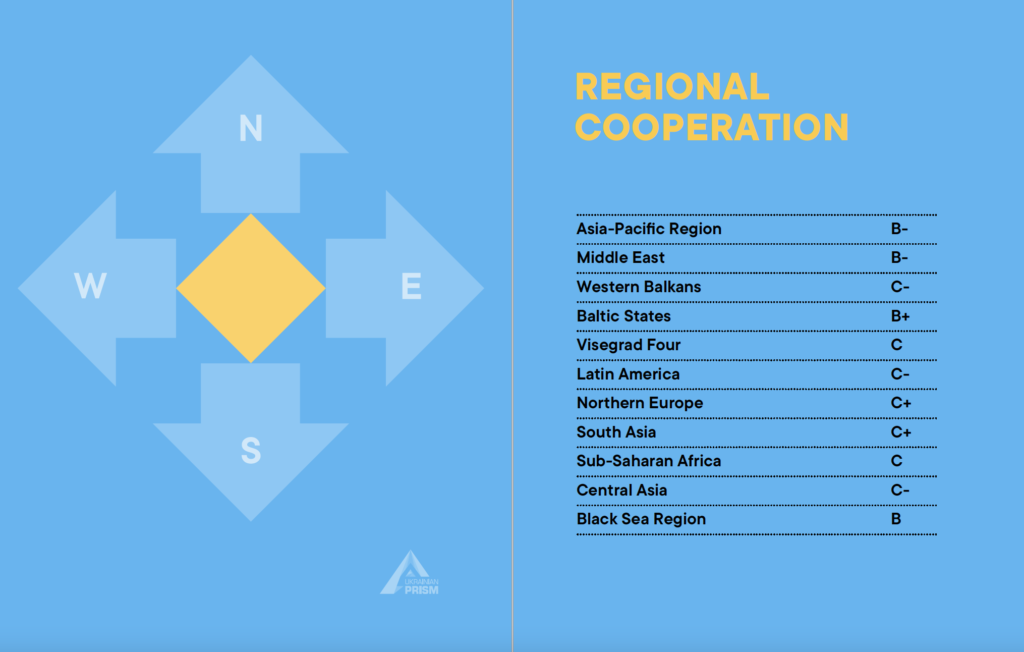 In the context of regional cooperation, Ukraine’s activities mainly focused on improving the security dialogue, promoting Ukraine’s exports and supporting Ukraine within international organizations. Growing political interest in various regions across the world did not always translate into practical activities in these areas.
In the context of regional cooperation, Ukraine’s activities mainly focused on improving the security dialogue, promoting Ukraine’s exports and supporting Ukraine within international organizations. Growing political interest in various regions across the world did not always translate into practical activities in these areas.
The pandemic had a serious negative impact on Ukraine’s activities in many regions across the world as visits, forums, and public events had to be cancelled. Some regions, such as Asia-Pacific and the Middle East, were in the President and the Foreign Affairs Minister’s spotlight at the beginning of 2020. In spring, the MFA held the first Asia Week.
The President and the Minister of Foreign Affairs maintained communication with various countries, including Algeria, Albania, Croatia, Chile, Egypt, Indonesia, Qatar, Libya, Lithuania, Morocco, North Macedonia, Saudi Arabia, Sweden, and the UAE, via telephone conversations.
Ukraine’s foreign policy activity on Western Balkans was not very proactive and usually focused on neutralizing the consequences of Russia’s aggression and support to Ukraine’s European and Euro-Atlantic integration. Work with Northern Europe was not intense either as most contacts there were limited to Sweden as the OSCE chair and Norway. Foreign policy on the Baltic states was traditionally active. Despite the pandemic and the cancellation of some events, dialogue with all three countries was maintained at all levels.
Cooperation with the Visegrad Four mostly took place through intense bilateral relations. The traditional meeting of Armed Forces commanders in September was the only manifestation of cooperation in the V4+Ukraine format.
Online platforms were used proactively throughout the year for business fora, meetings and presentations with partners from Asia and Latin America. Ukraine’s MFA initiated a series of online political consultations with Latin American and the Caribbean States, including Belize, Costa Rica, Guatemala, and Panama. Ukraine’s few embassies in the countries of Sub-Saharan Africa undertook the function of ensuring proactive dialogue with South Africa, Kenya, Ethiopia, and Senegal. The Embassy in Nigeria worked hard to free Ukrainian sailors that had been taken hostage by the pirates along the coastline of Benin, Gabon, and Equatorial Guinea.
Compared to the generally low scale of Ukraine’s relations with Central Asian countries in recent years, 2020 saw some increase of activity, even if not at the high level – via diplomatic missions, some executive authorities, business entities, etc. The most important events of 2020 in this area were the Ukrainian-Kazakh investment forum in October and the visit of Ukraine’s Infrastructure Minister to Kazakhstan in November.
Ukraine still views the Black Sea region from the perspective of bilateral dialogue and security, given the threats triggered by the Russian occupation of Crimea. Ukraine nominated a candidate for Secretary-General of the BSEC in 2020, which helped present and promote Ukraine’s agenda for the region.
Like in previous years, Ukraine was very active in international organizations, focusing primarily on protecting territorial integrity and sovereignty, dealing with the impact of Russian aggression, and protection of human rights. Ukraine successfully chaired the OSCE Forum of Security Cooperation in the second trimester of 2020, drawing attention to Russia’s aggression in the context of various aspects of European security. At the Council of Europe, Ukraine’s efforts mostly focused on PACE. Activities at the UN almost entirely shifted to Ukraine’s representative missions in New York, Geneva, and Vienna and to online events with the President, Vice Prime Minister for European and Euro-Atlantic Integration, and Minister of Foreign Affairs, among others, participating. In February, Foreign Minister V. Prystaiko had a working visit to the UN Headquarters in New York.
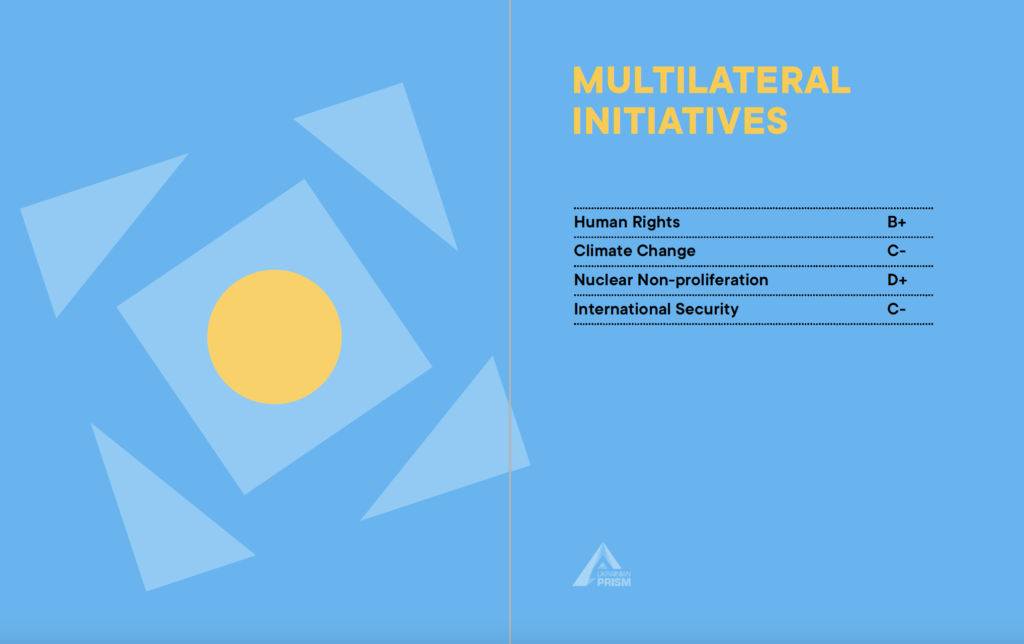 In terms of multilateral initiatives, only protection of human rights scored well. International political contacts with President Zelenskyy where Ukraine confirmed its climate commitments and engagement in the global fight against climate change took place at the end of the year. The work on the non-proliferation of nuclear weapons was essentially limited to participation in the UN General Assembly and the International Atomic Energy Agency. The issues of the international security agenda were left in the secondary portfolio in 2020. Ukraine continued its engagement in UN and NATO peacekeeping missions, consultations on information security, ways to counter hybrid threats, and security challenges triggered by the pandemic. Despite the COVID-19 pandemic, representatives of the Ukrainian Armed Forces joined important international exercises. Still, Ukraine lacked a clear stance on most conflict situations, including the Nagorno-Karabakh and Transnistria conflicts.
In terms of multilateral initiatives, only protection of human rights scored well. International political contacts with President Zelenskyy where Ukraine confirmed its climate commitments and engagement in the global fight against climate change took place at the end of the year. The work on the non-proliferation of nuclear weapons was essentially limited to participation in the UN General Assembly and the International Atomic Energy Agency. The issues of the international security agenda were left in the secondary portfolio in 2020. Ukraine continued its engagement in UN and NATO peacekeeping missions, consultations on information security, ways to counter hybrid threats, and security challenges triggered by the pandemic. Despite the COVID-19 pandemic, representatives of the Ukrainian Armed Forces joined important international exercises. Still, Ukraine lacked a clear stance on most conflict situations, including the Nagorno-Karabakh and Transnistria conflicts.
Economic and public diplomacy were ultimately integrated into Ukraine’s political ambitions. A strong focus throughout 2020 was on promoting Ukraine’s image in the world, its culture, goods and services across all regions. In economic diplomacy, European and Asian vectors stood out as priority ones.
Ukraine’s activities on Canada, Italy, Poland, Turkey, the USA, the UK, Baltic States, Euro-Atlantic integration, the OSCE, public diplomacy, and the fight against COVID-19 had the best scores.
The worst scored activities were on Sub-Saharan Africa and political and energy relations with Russia.
The overall score for Activities – 4 –”
Results
The status of the Enhanced Opportunities Partner with NATO received in June, and the Agreement on Political Cooperation, Free Trade, and Strategic Partnership between Ukraine and the UK signed in October qualify as the two most significant accomplishments of 2020. The 22nd offline Ukraine-EU Summit with President Zelenskyy that took place despite all pandemic restrictions and the Joint Statement on the EU’s unchanging support for Ukraine in de-occupation of its territory, reforms, and economic cooperation following the Summit, were important results, too.
The establishment of the Lublin Triangle as a new format of interstate cooperation can be listed as a strategic result of 2020. Its priorities include security, countering hostile disinformation, and the development of trade and infrastructure projects. The announcement of the Crimean Platform also delivered its first results as Canada, Moldova, Slovakia, Turkey, the UK, and the US agreed to join the platform.
A number of signed memoranda on military and military-technical cooperation, defence industry development, security assistance, etc., with Brazil, Iraq, Jordan, Qatar, Romania, Saudi Arabia, Turkey, and the UK were important accomplishments in the security domain. The Memorandum signed with the UK Export Finance was the most important development in this context. It provides for the possible allocation of £2.5bn-worth of British government export guarantee for joint Ukrainian-British projects in security and defence, agriculture, infrastructure, energy, and healthcare.
A number of other memoranda and agreements on cooperation in various sectors, signed with different countries throughout 2020, are worth mentioning as they highlight the wide range of priorities and opportunities that Ukraine is developing in bilateral relations. Examples include the 2021-2025 Intergovernmental Program of Cultural Cooperation between Ukraine and Italy; the Agreement to utilize the French loan for a water purification plant in Mariupol; a five-year USD 70 mln Program of Cooperation in the Space Industry between Ukraine and China; the Memorandum between Ukraine’s Ministry of Infrastructure and Slovakia’s Ministry of Transport and Construction on Cooperation in the sphere of combined transportation in routes between the EU and Asia through the territory of the two countries; the Memorandum on Cooperation between the Exporters and Investors Council and the Singapore Chinese Chamber of Commerce and Industry, etc.
In December, Ukraine gained support on two Crimea resolutions at the UN General Assembly and expanded their content, even though there is still no trend of more countries voting in support. The Ukrainian delegation to the UN also managed to counter Russia’s attempts to revise sanctions against it and exploit the COVID-19 pandemic for political purposes. Sanctions against Russia were generally preserved and expanded in 2020.
Noteworthy are the accomplishments on humanitarian, financial, and medical assistance provided to Ukraine throughout 2020 by countries of Europe, Asia, and the US. The Government of Germany provided EUR 70 mln to improve energy efficiency, sustainable economic development, democracy, civil society, governance and decentralization. In April, the Czech Republic initiated V4EastSolidarity, a program to allocate EUR 250,000 to Eastern Partnership countries, including EUR 125,000 to Ukraine, to help them fight against COVID-19.
Representatives of Ukraine were elected to various high positions at the UN and the PACE. In December, L. Nepop, Ukraine’s Ambassador to Hungary, was elected chair of the Danube Commission for 2021-2023. Ukraine nominated its candidate for Secretary-General of BSEC, but the results will be available in 2021.
Unfortunately, two events that are important for Ukraine did not take place as a result of the pandemic. One was the spring session of the NATO Parliamentary Assembly in Kyiv. The other one was an annual conference Ukraine Reform, scheduled to take place in Vilnius in 2020. Both were postponed to 2021.
In economic and trade cooperation, Ukraine managed to maintain its position in a number of countries across the world. Total exports of goods only shrank 1.8%, while imports fell 11%. Contrary to the declared intentions, Ukraine failed to sign an FTA agreement with Turkey.
Ukraine’ top 10 trade partners in 2020 included China (USD 15.4bn), Germany (USD 7.4bn), Poland (USD 7.36bn), Russia (USD 7.24bn), Turkey (USD 4.85bn), Belarus (USD 4.2bn), Italy (USD 4bn), the USA (USD 3.9bn), India (USD 2.7bn) and the Netherlands (USD 2.55bn).
The biggest growth of Ukraine’s exports compared to 2019 was to Honduras (18,557%), the Dominican Republic (3,200%), Zimbabwe (1,924%) and Saint Kitts and Nevis (1,174%). Exports to Pakistan and Cabo Verde increased fivefold. Among Ukraine’s top trade partners, exports to China almost doubled.
The biggest decline in exports, compared to 2019, among Ukraine’s important trade partners, was to Thailand (51% compared to the 2019 rate), Serbia (53%), Slovakia (63%), Greece (65%), Singapore (65%), and Egypt (71.8%).
The top 10 destinations for Ukrainian exporters in 2020 were China, Poland, Russia, Turkey, Germany, India, Italy, the Netherlands, Egypt, and Belarus.
The pandemic restrictions affected trade in services far more as total trade in services plummeted almost 30% in 2020. Ukraine exported USD 11.2bn-worth of services and imported USD 5.2bn-worth of services.
Total trade in services was the biggest with Russia (USD 2.8bn), the USA (USD 1.8bn), the UK (USD 1.04bn), Germany (USD 1bn), and Switzerland (USD 942 mln) in 2020. Ukraine enjoyed a trade surplus with all these destinations.
The top 10 destinations for the services exported from Ukraine in 2020 included Russia, the USA, Switzerland, Germany, the UK, Poland, Cyprus, the UAE, the Netherlands, and Israel.
The biggest growth of export of Ukrainian services was to the US Virgin Islands (2,223% compared to 2019), Uruguay (808%), Zambia (472%), North Korea (428%), and Bangladesh (328%). Export of services also grew almost threefold to the Philippines, Brazil, Peru, and Ethiopia.
Export of services plummeted the most to the Dominican Republic (1.3% of the 2019 rate), Uganda (1.4%), Oman (10%), Sri Lanka (17.6%), and Libya (18.9%). Out of Ukraine’s big trade partners, the greatest fall of export in services was to Russia (42% of the 2019 rate), Greece (48%), Spain (54%), and Italy (63%).
The results of foreign policy activities on Canada, Poland, Slovakia, the USA, the UK, Euro-Atlantic integration and the UN got the best scores.
The lowest scores on this indicator go to the work with Israel, Hungary, Russia, Sub-Saharan Africa, the Energy Community, climate change, international security, and non-proliferation of nuclear weapons.
The overall score for Results – “3+”


